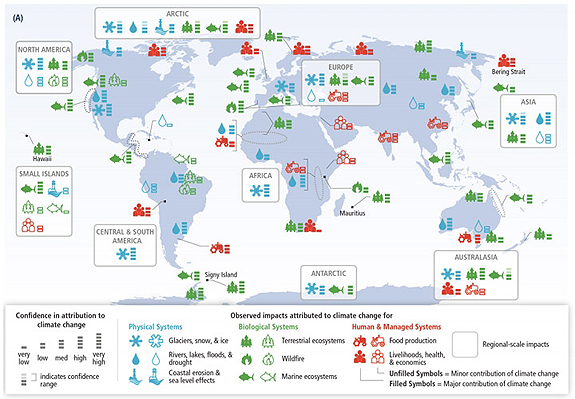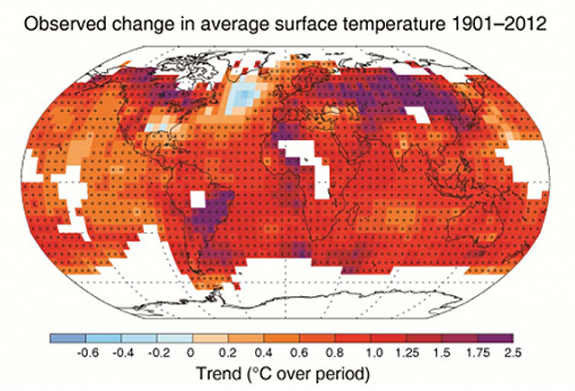By Andrea Thompson
Senior Science Writer
Climate Central
This is Andrea Thompson’s first post for EarthDesk. Andrea reports on extreme weather and climate change for Climate Central, and previously wrote for Live Science and Space.com. This article appeared on Climate Central March 30. More on Andrea at the conclusion.
The overall warming of the planet has had a clear impact on Earth’s natural systems and human society and will pose increased – and potentially disastrous – risks in the future if the world does not make a more concerted effort to adapt and try to prevent the worst possible outcomes.
That’s the continued message from the Intergovernmental Panel on Climate Change (IPCC), the United Nations-established body made up of hundreds of scientists who review and summarize the state of climate science and the research into its impacts, ways to adapt to them and ways to mitigate the damage. The IPCC report Climate Change 2014 and Summary for Policy Makers can be downloaded here.

The impacts of climate change and the ways in which both humans and nature can adapt to an altered environment are the focus of the second part of the IPCC’s fifth assessment report, which was released on Sunday. It follows the September release of the first portion of the report, which focused on the scientific evidence for global warming and stated unequivocally that humans are behind the warming of Earth’s average temperature.
Climate change has already contributed to a 1.6°F rise in global average temperature since the start of the 20th century and the rate of warming is likely to increase into the 21st century. The second report makes clear that in addition to a change in the global average temperature, other climate change impacts observed to date have hit all regions of the world and affected everything from access to food and water to extreme weather.
“In view of these impacts, and those that we have projected for the future, no one on this planet is going to be untouched by climate change,” Rajendra Pachauri, the chairman of the IPCC, said in the press conference announcing the report’s conclusions.
The report has fewer specific predictions of future impacts compared to the last iteration released in 2007, but points out the significant risks climate impacts pose to globe’s most vulnerable populations. It also has a greater emphasis on adaptation strategies, which range from improving urban infrastructure to creating drought-resistant crop varieties.
Compared to 2007’s report, the newest iteration “assesses a substantially larger knowledge base of relevant literature,” which allowed those assembling the report to consider a wider range of impacts, said Patricia Romero-Lankao, an author on the report and a sociologist with the National Center for Atmospheric Research (NCAR) in Boulder, Colo.
Among the impacts of climate change that are already occurring, the report calls out: shifts in the ranges of species and changes to migration patterns, which could alter where key ecosystems such as valuable fisheries are found; changes in precipitation patterns, which affect the availability of water for drinking and agriculture; the effects of climate extremes on crops, which could threaten food supplies and the livelihoods of the world’s farmers; and increases in health impacts, for example the number of deaths from heat waves, like the one that killed thousands in Europe in 2003.
All of these impacts are also listed as major future concerns around the world. The report also calls out sea-level rise as a major future concern, as it contributes to coastal flooding and higher storms surges – issues that particularly affect those in low-lying coastal areas, where a substantial portion of the world’s poor live. Extreme weather events could also damage critical infrastructure, even in developed countries, if steps aren’t taken to strengthen it, as Hurricane Sandy’s inundation of sewage systems and New York City’s subway system made clear.
The report also warns that climate change could exacerbate problems, such as drought, that lead to conflicts around the world through migrations and disputes over resources.
“Climate change can lead to displacement, can lead to increased conflict,” Pachauri said.
All of these impacts are expected to worsen in the coming decades if society fails to adapt to the changes that are already in play because of warming “locked in” to the climate system by past greenhouse gas emissions and if it fails to enact any meaningful measures to curtail future emissions, the report makes clear. The more warming, the more dire the future impacts become.
“Increasing magnitudes of warming increase the likelihood of severe, pervasive, and irreversible impacts,” the report warns.

The first part of the fifth assessment report stated that global temperatures are likely to exceed 2.7°F above preindustrial levels by the end of the century but could reach as high as 8.64°F above 1986-2005 levels, depending on the levels of future emissions. At the Copenhagen climate summit in 2009, governments agreed to keep future warming below 3.6°F, which the report suggested was unlikely to happen because of the warming that past emissions have guaranteed. The third part of the assessment, focused on ways to mitigate climate change, will be released on April 13 after a meeting in Berlin.
The report examines the efforts at adaptation that have been made around the world to date, which vary widely between regions, and those that should be considered for the future. Strategies mentioned in the report vary from establishing better building codes to spreading more efficient irrigation practices, with many that would provide benefits to society even without climate change.
“A lot of these things make sense anyway,” said Kevin Trenberth, a climate scientist also from NCAR, who was not involved with this report but has been an author and editor on past IPCC reports.
Trenberth suggested the report could be improved by noting which adaptations strategies would have the biggest impact and how costs for them would be covered. He did applaud the group for noting funding gaps for adaptation, which are particularly affecting developing nations, which are expected to see impacts out of proportion to what they have contributed to global warming.
Romero-Lankao said that the process of putting together the report was an educational one for her, illuminating the process of international negotiations.
“We scientists think that all what is needed from us in these negotiations is to ensure accuracy, balance, and clarity of message in our findings. That is not the case for policy makers for whom a lot is at stake,” Romero-Lankao told Climate Central in an email.
«« »»
 Andrea Thompson is a Senior Science Writer at Climate Central, “an independent organization of leading scientists and journalists researching and reporting the facts about our changing climate and its impact on the American public.” Andrea’s reporting focuses on extreme weather and climate change. Previously, she was a writer and reporter for Live Science and Space.com, reporting on climate change, weather and other science-related topics. She graduated from Georgia Tech with a B.S. in Earth and Atmospheric Sciences in 2004 and a Master’s in the same subject in 2006. She attended the Science, Health and Environmental Reporting Program at New York University and graduated with a Master of Arts in 2006. More reporting from Andrea here.
Andrea Thompson is a Senior Science Writer at Climate Central, “an independent organization of leading scientists and journalists researching and reporting the facts about our changing climate and its impact on the American public.” Andrea’s reporting focuses on extreme weather and climate change. Previously, she was a writer and reporter for Live Science and Space.com, reporting on climate change, weather and other science-related topics. She graduated from Georgia Tech with a B.S. in Earth and Atmospheric Sciences in 2004 and a Master’s in the same subject in 2006. She attended the Science, Health and Environmental Reporting Program at New York University and graduated with a Master of Arts in 2006. More reporting from Andrea here.









